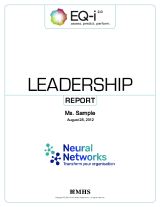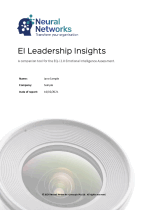Are your leaders emotionally intelligent?
Although Emotional Intelligence (EI) is now widely acknowledged as a predictor of leadership capability, do you know what level of emotional intelligence your leaders are currently demonstrating?
We understand that emotional intelligence is talked about a lot, but it can be hard to grasp what that really means in terms of day-to-day leadership actions. Fortunately, the ability to assess and measure emotional intelligence is now well established.
Research has shown a leader’s EI can be strengthened and improved by benchmarking current capabilities across a range of scales and devising a training program that focuses on growth opportunities.

World-leading emotional intelligence leadership assessment
Neural Networks worked in partnership with Multi-Health Systems (MHS), who own the EQ-i 2.0 Emotional Intelligence Assessment, to design a powerful leadership lens that extends on an individual leader’s EI results.
An overall emotional intelligence score is provided by the EQ-i 2.0® emotional intelligence and leadership assessment. The EQ-i 2.0 profile, together with our Leadership Insights report will provide you with powerful insights into the leader’s strengths and indicate the highest priority development areas.
Each capability is broken down into sub-capabilities where the emotional intelligence sub-scale analysis is conducted. This capability is flagged as a potential development opportunity if a defined sub-scale combination is present.
EQ-i 2.0 & NNC Leadership Insights Sample Reports
You can view a sample of both the EQ-i 2.0 and NNC Leadership Capability Lens reports below.
Solutions Showcase
Solution 1 - Overwhelmed leadership team of government agency
The challenge
- Significant workload and political pressure leading to overwhelm and focus on urgent rather than important tasks.
- Need for leaders to focus on key priorities and avoid reverting to easy tasks in challenging times.
- Political spotlight on them heightened the situation.
- Director's need for a way to help leaders focus and assess their capabilities.
Our solution
- Defined role clarity to provide clear expectations and prioritise key activities.
- Mapped PSC Capability Framework against EQ-i 2.0 Emotional Intelligence assessment.
- EQ360 assessments for leaders to measure self-perception and feedback from others.
- Analysis of EQ360 results to identify capability gaps against the PSC Capability Framework.
- Design of a tailored leadership program based on analysis results.
- One-on-one coaching sessions to embed learning, contextualise it to the environment, and address mindset issues.
Solution 2 - Internal Process Improvement for financial institution
The challenge
- Lean Six Sigma initiatives identified a need for increased emotional intelligence for successful implementation.
- Desire to develop self-awareness and understanding of emotional intelligence among a large group in a short timeframe.
- Importance of understanding the impact of emotions and behaviours on others and managing emotional states.
- Need for leaders to foster inclusivity in the workplace (as a mandatory scorecard measure).
Our solution
- Unique program design with a long-term scaffolded approach.
- Phase 1: EQ360 profiling and debriefs for leaders, EQ-i 2.0 self-assessments and debriefs for team members, and a half-day workshop on building awareness and critical EI competencies.
- One-on-one coaching for leaders based on EQ360 results.
- Phase 2: Focus on embedding elements like internal capability development, a coaching framework, Master Coach program and support for building resilience and agility.
Solution 3 - Emerging Leaders Recruitment for bank division
The challenge
- Identify emerging leaders with high emotional intelligence for a program.
- Analyse potential participants' EI profiles against a leadership framework.
Our solution
- Integrated EQ-i 2.0 Workplace Report into the Assessment Centre for questioning on critical EI competencies.
- Applicants completed EQ-i 2.0 as part of the interview process.
- Mapped EQ-i 2.0 against key competencies and provided an analysis template for internally EQ-i Certified professionals.
- Developed experiential and behaviour-based interview questions based on individual assessment results.
Our emotional intelligence and leadership experience
The Neural Networks team has been assessing, training, and developing emotionally intelligent leaders for over two decades and has extensive experience providing emotional intelligence and leadership training to organisations in almost every industry.
Frequently Asked Questions About Emotional Intelligence & Leadership
Effective leadership doesn’t happen by chance—it requires intentional development and continuous learning.
Overall, the EQ-i 2.0 has a strong foundation of reliability and validity, making it a valuable tool for assessing emotional intelligence.
The EQ-i 2.0 assessment helps your leaders to adjust and adapt emotions, develop and maintain relationships, use emotional information, and cope with challenges.
We map emotional intelligence using the market-leading EQ-i 2.0® Emotional Intelligence Assessment.
Emotional intelligence enables leaders to build strong relationships, communicate effectively, resolve conflicts, motivate and inspire, and manage stress and adversity.
Blog Posts About Emotional Intelligence & Leadership
Great leaders don’t just emerge by chance—they are developed through intentional growth, learning, and experience. Whether you’re a business leader looking to strengthen your own leadership skills or an organisation aiming to build a strong leadership pipeline, having a structured leadership development plan is essential.
In today’s workplace, understanding emotional dynamics is critical to fostering engaged, productive teams. For professionals in HR, People and Culture, or Learning and Development, navigating the complexities of human behaviour often feels overwhelming. The challenge lies in not only managing but truly understanding what drives individuals and teams to thrive. This is where the EQ-i 2.0 emotional intelligence tool can revolutionise your approach and elevate your career.
Many leaders excel in technical expertise but find themselves struggling with a critical component: the human side of leadership.
Learn about how optimism supports self-awareness, empathy, and social skills, driving better personal and professional outcomes.
The modern workplace is a complex landscape, and understanding the factors contributing to stress is essential for organisations and individuals alike.

 +61 9555 7955
+61 9555 7955





